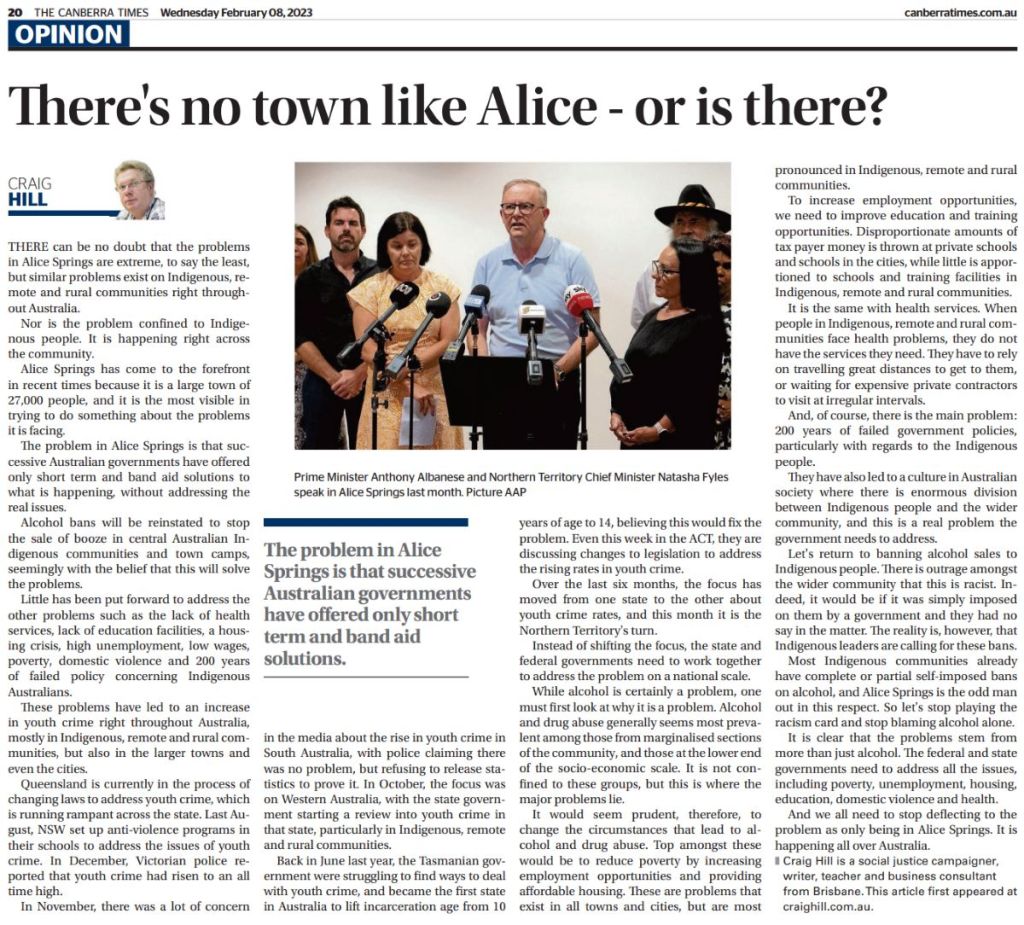There can be no doubt that the problems in Alice Springs are extreme, to say the least, but similar problems exist on Indigenous, remote and rural communities right throughout Australia.
Nor is the problem confined to Indigenous people. It is happening right across the community.
Alice Springs has come to the forefront in recent times because it is a large town of 27,000 people, and it is the most visible in trying to do something about the problems it is facing.
The problem in Alice Springs is that successive Australian governments have offered only sort term and band aid solutions to what is happening, without addressing the real issues.
As example, it has been proposed that bans be put on alcohol sales, seemingly with the belief that this will solve the problems.
Little has been put forward to address the other problems of lack of health services, lack of education facilities, a housing crisis, high unemployment, low wages, poverty, domestic violence and 200 years of failed policy concerning Indigenous Australians.
These problems have led to an increase in youth crime right throughout Australia, mostly in Indigenous, remote and rural communities, but also in the larger towns and even the cities.
Queensland is currently in the process of changing laws to address youth crime, which is running rampant across the state. Previously, NSW has set up anti-violence programs in their schools to address the issues of youth crime. In 2022, Victorian police reported that youth crime had risen to an all time high.
There was a lot of concern in the media about the rise in youth crime in South Australia, with police claiming there was no problem, but refusing to release statistics to prove it. Then the focus was on Western Australia, with the state government starting a review into youth crime in that state, particularly in Indigenous, remote and rural communities.
The Tasmanian government have been struggling to find ways to deal with youth crime, and became the first state in Australia to lift incarceration age from 10 years of age to 14, believing this would fix the problem. Even in the ACT, they are discussing changes to legislation to address the rising rates in youth crime.
Over the last two years, the focus has moved from one state to the other about youth crime rates, and this month once again it is the Northern Territory’s turn.
Instead of shifting the focus, the state and federal governments need to work together to address the problem on a national scale.
While alcohol is certainly a problem, one must first look at why it is a problem. Alcohol and drug abuse generally seems most prevalent amongst those from marginalised sections of the community, and those at the lower end of the socio-economic scale. It is not confined to these groups, but this is where the major problems lie.
It would seem prudent, therefore, to change the circumstances that lead to alcohol and drug abuse. Top amongst these would be to reduce poverty by increasing employment opportunities and providing affordable housing. These are problems that exist in all towns and cities, but are most pronounced in Indigenous, remote and rural communities.
To increase employment opportunities, we need to improve education and training opportunities. Disproportionate amounts of tax payer money is thrown at private schools and schools in the cities, while little is apportioned to schools and training facilities in Indigenous, remote and rural communities.
It is the same with health services. When people in Indigenous, remote and rural communities face health problems, they do not have the services they need,. They have to rely on travelling great distances to get to them, or waiting for expensive private contractors to visit at irregular intervals.
And, of course, there is the main problem – 200 years of failed government policies, particularly with regards to the Indigenous people. These policies have, in the past, included extermination, assimilation, integration and many other less than favourable “solutions” to what governments have seen as “the Aboriginal problem.”
They have also led to a culture in Australian society where there is enormous division between Indigenous people and the wider community, and this is a real problem the government needs to address.
Let’s return to banning alcohol sales to Indigenous people. There is outrage amongst the wider community that this is racist. Indeed, it would be if it was simply imposed on them by a government and they had no say in the matter. The reality is, however, that Indigenous leaders are actually calling for these bans to be reimposed.
Most Indigenous communities already have complete or partial self-imposed bans on alcohol, and Alice Springs is the odd man out in this respect. So let’s stop playing the racism card and stop blaming alcohol alone.
It is clear that the problems stem from more than just alcohol. The federal and state governments need to address all the issues, including poverty, unemployment, housing, education, domestic violence and health.
And we all need to stop deflecting to the problem as only being in Alice Springs. It is happening all over Australia.
Craig Hill is a Brisbane-based Social Justice Campaigner, Writer, Teacher and Business Consultant. He has campaigned for social justice in Australia, promoted human rights in China and worked with the homeless in Honolulu. He holds a Graduate Certificate in Business, a Graduate Certificate in Education and a degree in Management. He is also the General Manager of Advance Institute of Business.
If you liked this article, please click “Subscribe To My Blog” in the sidebar to receive an email each time a new article is published.
Advance Institute of Business has nationally recognised Certificate and Diploma courses available to help you progress in your career.
Career Paths allow you to develop industry skills in 42 career sectors

Career Paths are a new educational resource for industry specialists who want to improve their communication in a work environment. Incorporating career-specific vocabulary and contexts, each unit offers step-by-step instruction that immerses students in the four key language components: reading, listening, speaking, and writing.
There are three levels for each industry, each level incorporating 15 x 3 hour sessions. They can be done face to face or online.
These courses are ideal for those wishing to get ahead in their careers, and for those intending to do formal studies at college or university.
We have the following Certificate and Diploma courses available for your career development:
Teaching Courses
Business
Leadership and Management
Entrepreneurship and New Business
- Certificate III in Entrepreneurship and New Business
- Certificate IV in Entrepreneurship and New Business
Accounting
We will soon also be offering:
- Advanced Diploma of Business
- Diploma of Human Resource Management
- Diploma of Marketing and Communication
And there will be more courses to come in the future.
Our non-accredited speciality courses:
- Career Paths (43 career paths to choose from)
- Corporate Training
- Business English
- English Tutoring
- University and College Tutoring
- Professional and Academic Writing Skills
- Where to Study in Australia
- Education Consultancy
25% discount on all courses for Centrelink and Veteran’s Affairs recipients.
Courses are nationally recognised through our Registered Training Organisation partner Skills Recognition International (RTO 32373). We also have an advisory service on where to study in Australia.
To register your interest in these courses, and arrange a free private call, please click here
Appeared in The Canberra Times and 170 other publications
Discover more from Craig Hill Media
Subscribe to get the latest posts to your email.



